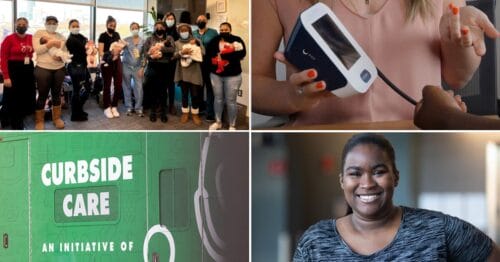Can Group Prenatal Care Improve Pregnancy Outcomes?
October 4, 2022

Courtesy of Estefany Flores-Godaire
"The Centering model really engages the patient to become more assertive about their healthcare."
Among 11 of the world’s wealthiest countries, the U.S. has the worst maternal health outcomes, especially for Black and Indigenous Americans. Disparities in maternal health are so stark that the U.S. Commission on Civil Rights (USCCR) is now required to publish an annual report documenting how the federal government will address them. As outlined in the 2021 report, access to quality prenatal care and education was determined to be critical in closing the gap in maternal health outcomes.
More than 20 years earlier, CenteringPregnancy had already developed an evidence-based model of group prenatal care that works to “create a future where the risk of preterm birth, the inequities of Black women dying from pregnancy related causes and the disparities in early childhood are greatly reduced.” Now available at nine locations in Massachusetts, including at the Obstetrics and Gynecology Adult Ambulatory Clinic at Boston Medical Center (BMC), CenteringPregnancy aims to empower and educate pregnant people in a supportive learning environment.
A different model of prenatal care
Unlike a traditional prenatal model in which a pregnant person has quick, individual visits with their provider, Centering participants meet in a group of 8 to 12 other pregnant people for 10 to 12 sessions throughout their pregnancies and then twice during the postnatal period. Each two-hour visit includes an individual health visit, collaborative learning, and social support. Weekly topics are often suggested by participants and range from developing a birth plan, preventing anemia and hypertension, preparing for breastfeeding, and knowing the risks of postpartum depression.
Lorenis Liriano, who participated in a CenteringPregnancy group at BMC, says the connections she made with her peers and her midwife, Melissa Nelson, CNM, made for a “beautiful” experience.
“Melissa genuinely loves her job. Throughout the whole experience, she was educating us and supporting us. The fact that she was also a woman of color was important,” she tells HealthCity. And about her fellow pregnant peers, she says, “We were able to talk about our different cultures — Dominican, African, Indian, American — and learn about each other’s traditions.”
In hospital, BMC offers CenteringPregnancy in Spanish and English, which helps increase access and establish trust with patients. For patients looking for sessions in Haitian Creole, Codman Square Health Centerand Mattapan Community Health Center, two BMC-affiliated centers, have made those available. A care navigator co-leads the sessions to connect patients to community resources, including WIC and Room to Grow.
“If a patient doesn’t have housing or doesn’t have the financial means to make it to their next appointment, we need to resolve that first before they’ll want to talk about their pregnancy,” says midwife Estefany Flores-Godaire, CNM, director of CenteringPregnancy at BMC and leader of the Spanish-language group. “We normalize, destigmatize, and close a lot of loops for our patients.”
Flores-Godaire says that many pregnant people seeking care at BMC have never before seen a primary care provider, so the prenatal period is a chance to engage them in their overall health.
“Pregnancy is a window where we can see what we might suffer from later in life,” she explains. “It’s a great time to capture folks and motivate them to take care of their health, because not only are they going to be living for themselves, but also for their babies and families. The Centering model really engages the patient to become more assertive about their healthcare.”
Proven outcomes of CenteringPregnancy
In a 2012 focus group of CenteringPregnancy participants, four themes emerged about their care and experience:
- “It’s about respect.”
- “Knowledge is power.”
- “I’m a better mother.”
- “Supporting each other.”
These themes resonate with Liriano. “For my first two pregnancies, I thought we just had to do whatever the doctor told us to,” she recalls. “I didn’t know a mother had rights. I loved Centering for my third pregnancy because I could openly ask questions, and we talked about our personal views on just about everything. They let us know we have options.”
For extra support, Liriano also had a Birth Sisters Program doula. “My third delivery was the most painful, but mentally, I was in a better place. I was prepared to the point that I gave birth with one push.”
Flores-Godaire says this type of feedback is supported by published research in the Journal of Midwifery and Women’s Health on how the CenteringPregnancy model of group prenatal care holds promise for improving the birth outcomes of all pregnant persons. Similarly, a 2017 study in the American Journal of Obstetrics and Gynecology found that Black pregnant people who participate in group prenatal care experienced lower rates of preterm birth, though more research on larger sample sizes is needed in both cases.
Flores-Godaire and her colleagues are working on tracking, evaluating, and reporting on their data, which they are confident will show that CenteringPregnancy leads to improved maternal and newborn health outcomes, including:
- lower rates of preeclampsia
- lower preterm births
- higher rates of normal spontaneous vaginal deliveries
- higher vaginal birth after cesarean VBAC success rates
- higher rates of breastfeeding
- reduction in postpartum hemorrhage
- higher rates of postpartum retention
- higher rates of postpartum contraception
Liriano’s experience is a perfect example of how Centering can improve the health of the pregnant person and the baby. While carrying Naveen, Liriano had debilitating pelvic pain due to symphysis pubis dysfunction. Some days, it was hard to even get out of bed.
“I was going through a lot of personal things,” she shares. “Even though I had depression and anxiety, Centering helped me know that I wasn’t the only one going through it.”
Is group prenatal care scalable?
CenteringPregnancy has near universal coverage, making it easy for other institutions to adopt and scale. Flores-Godaire already has specific visions for ways to enhance and expand the program within BMC.
“I have visions of eventually offering Centering to more higher risk populations as a way to normalize their pregnancies and birth,” Flores-Godaire says, noting that currently the CenteringPregnacy model at BMC is geared toward low-risk pregnancies. “A specific group of pregnant persons who may benefit from CenteringPregnancy are those with gestational diabetes. It would be ideal to also engage these folks and provide them with the education and tools they need to be assertive about their healthcare. We already have the foundations of a great collaboration with our maternal fetal medicine doctors to make this possible.”
She adds that there are other groups within BMC — Project RESPECT and the Fibroid Center, for examples — that are starting to offer a Centering model, so she also sees unlimited potential to expand from within, thanks to what she calls the “magic” of BMC.
“We are all here for the same mission, we all work together and support each other when we see a benefit to our patients.”


